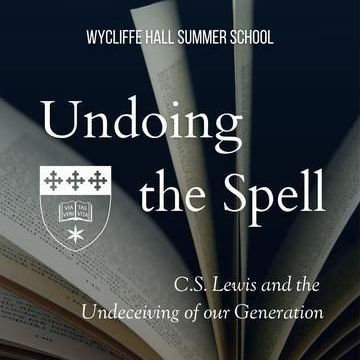Why study Scripture? A case for academic study of the Bible
Why study academic theology? Here's a few observations from me.
******
I had a lovely lunch with my sister-in-law, Lola, the other day. In the course of all the various topics we were catching each other up on, I got talking about why I do what I do. Why is thoughtful, academic scholarship and study of the Bible important for Christians seeking to do God's will in the world? What's its value?
I didn't give an exhaustive answer to Lola. I'm not even going to attempt to do that now. But I think there are two pointers that are really helpful and are, at least, part of the answer.
(1) Academic study of the Bible is evidence-based. (We learn to see God (and his people) as He is depicted in Scripture, not as we want Him to be)
I've not been teaching at Wycliffe for very long. I've only just passed the 18month mark. But what I encounter quite frequently when people come to study the Bible for the first time, is how easy it is to read what we think the text says rather than what it actually says. It's really easy to do. So much so, we've all done it. I remember reading something a trained and locally-prestigious professional once said:
"The essential meaning of the Book of Jonah is individuation and becoming who you are."
Really?!
That's a stretch by any measure. Jonah is more about the propensity of God's people to draw boundaries which want to exclude repentent outsiders in comparison to a God who is far more generously-minded. The book concludes with very little resolve--it actually wraps up in chapter 4 with Jonah still angry (angry enough to die no less!) and God asking a question about his right to have mercy on a city full of people and animals. It's not about individuation.
We are prone to bring things into our reading of a biblical text that aren't there. Even good, honourable and perhpas noble things. Yes, there's more than one way to read a story as there is any text. But there are also readings that haven't really grappled with what the text actually says and seems to miss the point entirely (and perhaps invent an entirely novel one).
Take the Book of Amos. It has very little hope. It's a rougher ride than any other OT prophet. It's largely judgement and doom-and-gloom on the people of Israel. Does that mean I believe God is all doom-and-gloom? No! But I'm not going to read Amos and pretend that it is something it's not. The Book of Amos is important. It has a lot to say that, if we are wise, we will listen to. Instead, I'm going to learn from the book about God's demand for righteousness, justice and equity from his own people. I'm going to learn to take seriously how abhorrent God finds it when his people take advantage of their position and oppress, marginlise, and dehumanise others.
The academic study of Scripture engages with what is actually there. Academic journals, books and articles have arguments based in the text, in conversation with archaeology, sociology, and anthropology. Things that can be weighed, considered and evaluated by anyone (regardless of their faith). This is a good thing! The Bible is humanly written and divinely inspired. And God isn't afraid of humanity, penmanship or literary criticism. He is the God of all and saw fit to take on human flesh. Dealing with the "flesh" of biblical literature honours Him.
So we can ask what is actually in this passage? What does the story say? What does the psalm say? What do the gospels actually say?
Academic biblical studies trains people to think well [side note: remember that thing Jesus said about loving God with our heart and our mind? This is part of it!]. To read the text well. To set aside their preconceptions and see what's actually happening on the page. I could say a lot here about the value of learning Greek and Hebrew here, but I'll stop...
The long and short of it is this: it helps the Christian to read the Bible well. Not perfectly (we never escape our own situation and bias), but well. And my hope for every student is that they go away from class a bit more attuned to the details of the text and a little less atuned to their own interpretation of what they think it says.
***
(2) Reading differently = living differently. (Or simplistic answers = simplistic pastors)
Learning to look at the evidence, consider the reasoned arguments of others and evaluate them (hopefully charitably) leads to a better reading of the Bible. Which leads to a better understanding of how God has revealed Himself (not how we assume He has). But I also believe it makes us better listeners and readers of the world around us. Of pastoral situations. Of opportunities for outreach and mission. Of our own faith journeys and spiritual growth.
I read somewhere this year a piece of wisdom that has stuck with me. It was about doing things like laundry or washing-up. It said "how you do the mundane task is how you do every task." Or something like that. Probably a bit pithier. The point was about how we so often rush through the things we don't want to do bcause of an urgent sense we must maximise our time on the things we deem important [side note: I'm guilty of this one...]. But the logic is flawed. The truth is if we are faithful and diligent in the washing-up or laundry (or whatever other task we try and avoid), we are training ourselves in smaller ways to be faithful and diligent in the "urgent" stuff we want to spend our time on. We may not have as many minutes for those things, but we'll use the time we have far more wisely (not to mention, we won't be as rushed). We'll be better equipped for the work.
So how does laundry connect to academic biblical study? Well, learning to think well is learning to think well.
Learning to look at the evidence is learning to look at the evidence. Academic study of the Bible is an especially important place to do this. Why? Because it can make people better pastors. Because they'll think better. They'll engage better with evidence. They'll not assume they have the answers but be willing to wrestle with reality and reframe their perspective as needed.
Now, you might argue, if they have any academic degree, shouldn't that apply? What's so special at biblical studies? Great point. And, to some extent, I agree. But here's where people often get stuck. Academic biblical study brings together ones reasoning mind and personal faith into conversation. Someone can have the most wonderful education in another subject, but never have had to bring their faith into that conversation, so when they study the Bible for the first time, they struggle. [This is not true for all people. I am generalising a bit to make a point.] Academic study of Scripture is unusual in that it is a space in which people learn to think well in overt connection with things that affect and shape their faith.
When I first studied theology, as a fairly naive 19 year old, I found it hard to reconcile Abraham as a middle eastern nomad among middle eastern nomads with the Sunday School version of Abraham I had formed in my head. The Abraham I'd learned about at church was a borderline superhero. Now, I had top grades in my subjects at school. I knew how to think. Deal with evidence. But my faith had a lot growing to do. And it was in studying the Bible academically, that I began to wrestle these things out. I was confronted with something in my studies that, in turn, confronted my faith. It was a refining and growing experience. Learning to see the humanity in the text helped me see my own humanity better. It helped me see the world around me better. God's people aren't superheroes. They are painfully normal, broken and confused people. Dealing with the evidence of the text and history and then wrestling it out with my faith, helps me to be better at doing the same in the world around me. It helped make me a better pastor (and continues to do so).
***
Now, don't get me wrong. I'm not convinced that theology degrees are all that useful in the New Creation. God cares little about anyone's educational status or intellectual ability. Scholars in theological colleges and faculties are no better than anyone else, morally, spiritually or otherwise. Some study theology but never let it do the spiritual work I've suggested above.
But let's not throw the baby out with the bathwater. Otherwise we could end up in a fantasy land where we create gods of our own imagination. We are minds as well as bodies and hearts. We are called to mental action as well as physical. To think well. And to be trained in our thinking. We each have gifts we have been given to use, appreciate and allow God to integrate within us. Why? So we can all grow into all that God has made us to be. We have gifts, including academic ones. So let's use them. Even if it's a little painful at times.
******
And a shameless, shameless plug here... If you're interested in stretching your mind in this way, here are some upcoming possibilities that Wycliffe Hall are providing:
- Forum in Houston, November 2025 - Wycliffe Hall Forum | WYCLIFFE HALL
- Summer School in Oxford, 2026 - Wycliffe Hall Summer School 2026 | WYCLIFFE HALL
- Study Week in Oxford, 2026 - Wycliffe Hall Study Week 2026 | WYCLIFFE HALL
******



